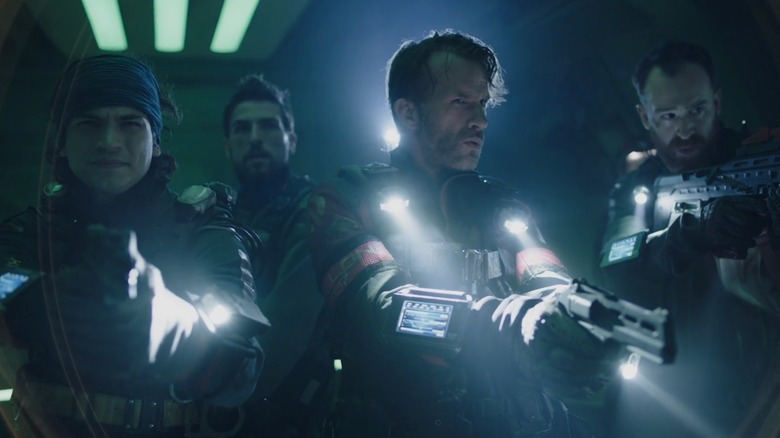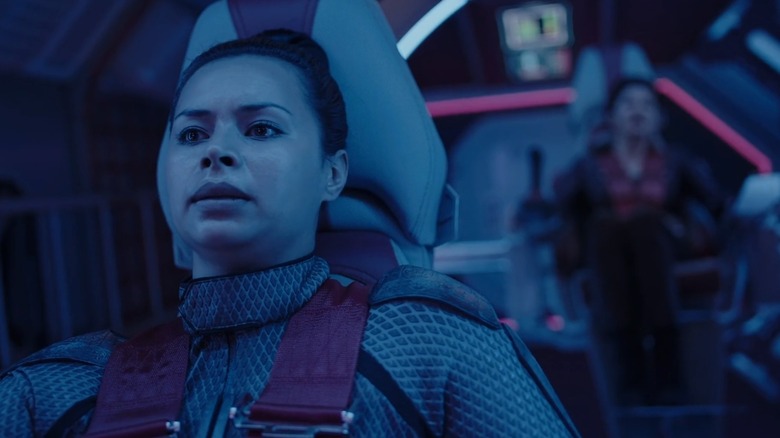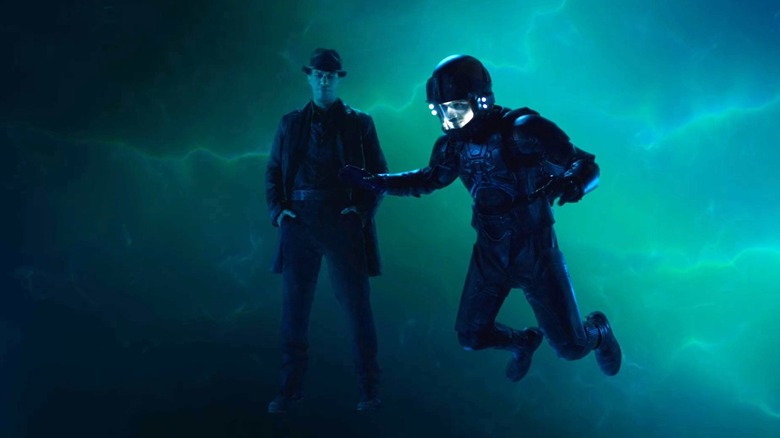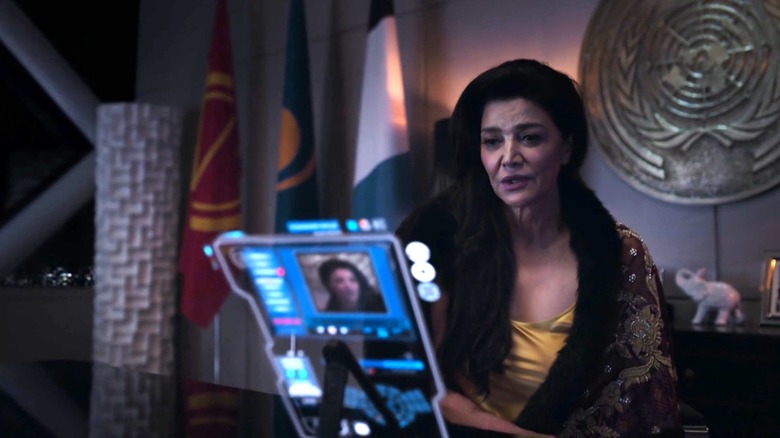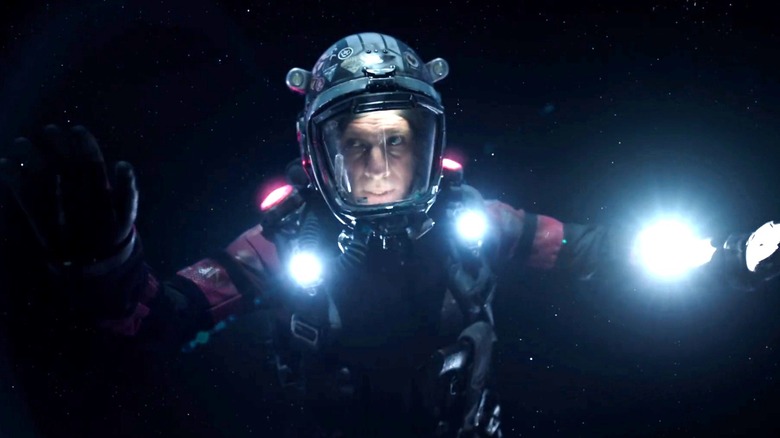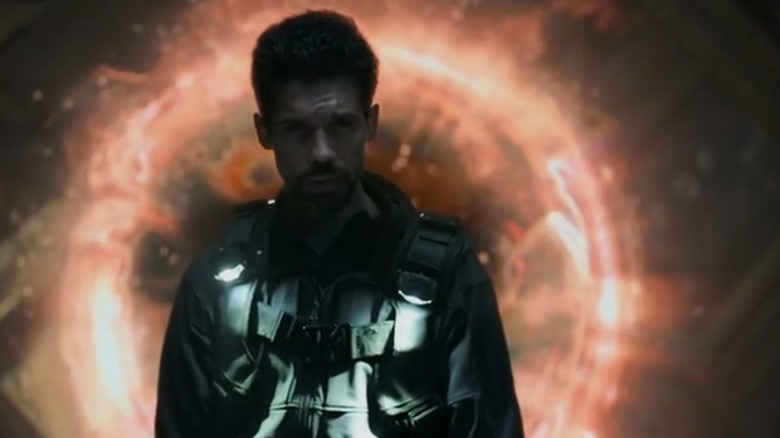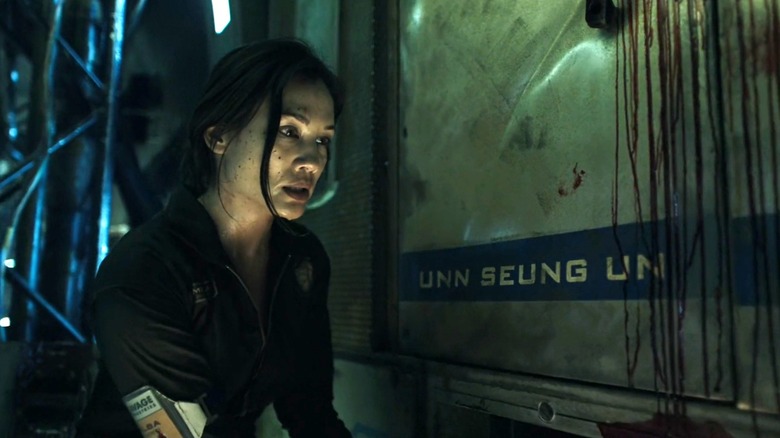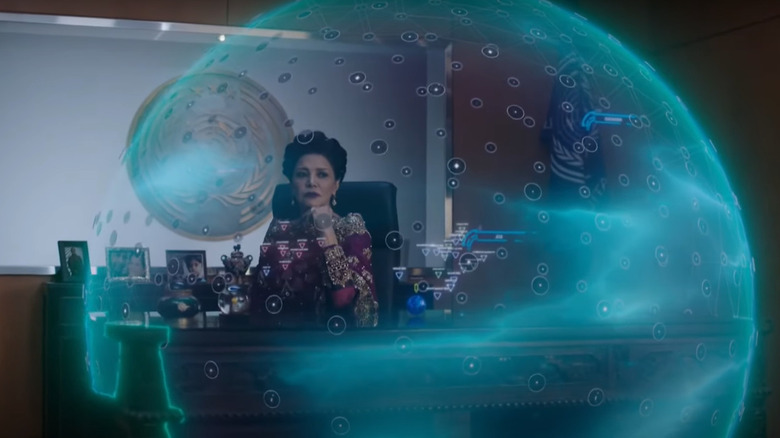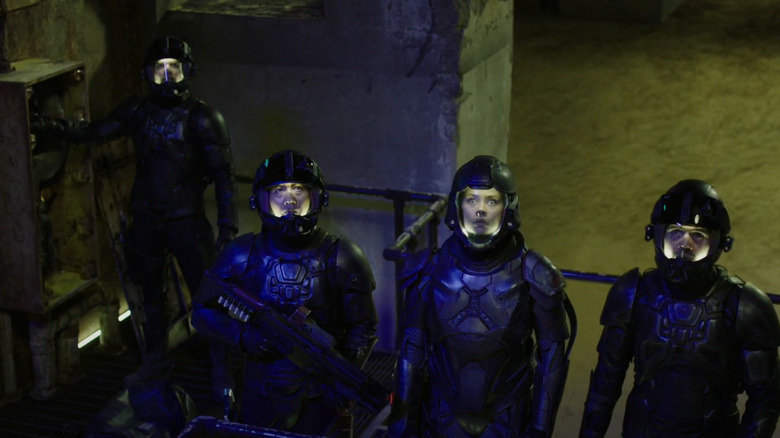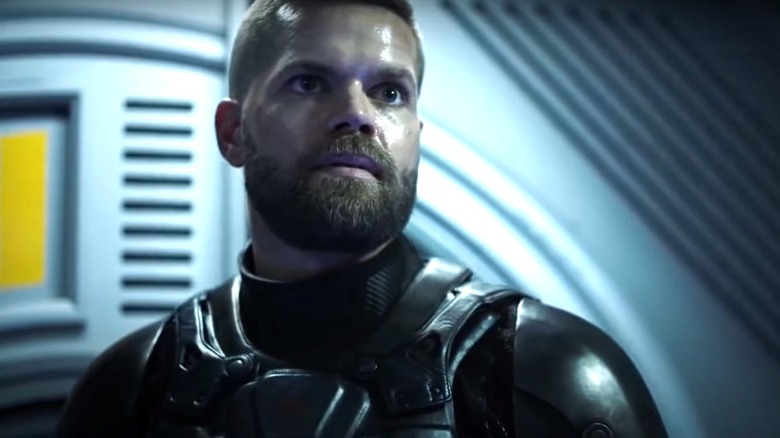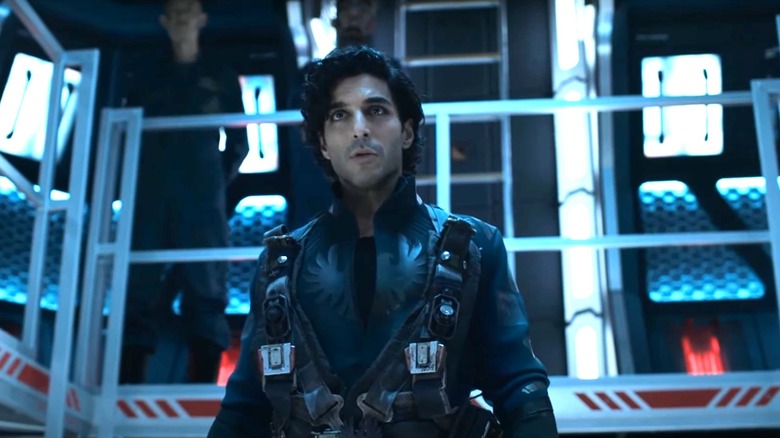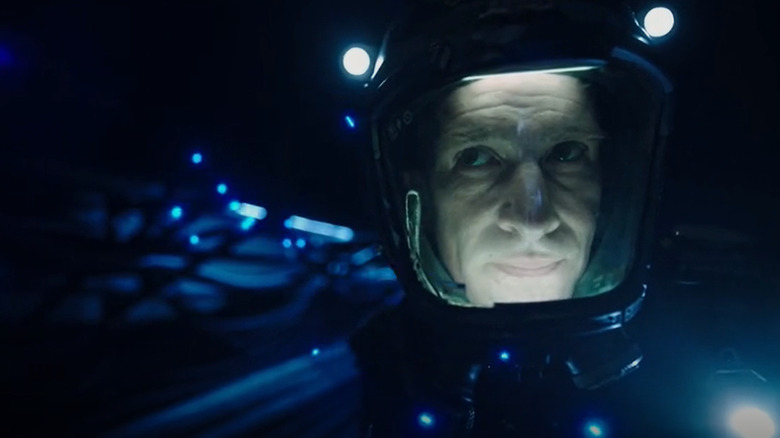The Best Episodes Of The Expanse According To IMDb
Centuries into the future, humanity has become a spacefaring civilization, and in doing so, has exported its many ills — colonialism, racism, unfettered capitalism — to the rest of the solar system. Three factions — Earth, Mars, and the working-class Asteroid Belt — attempt to wrest power from one another. Caught up in these power games are the Belter detective Josephus Miller (Thomas Jane), U.N. undersecretary Chrisjen Avasarala (Shohreh Aghdashloo), heiress Julie Mao (Florence Faivre), and the unsuspecting crew of the Rocinante. What begins as a juicy mystery surrounding the disappearance of the rebellious Julie soon spirals into a galaxy-spanning space opera, complete with corporate greed, treason, alien life-forms, and terrorism.
Thus far, the show has enjoyed that rare privilege of being both a critical darling and a fan favorite. Over the years, "The Expanse" has been fondly referred to by many critics: One calls it the most "politically relevant" show of its time; another describes it as "Game of Thrones in space." Yet another dubs it the "spiritual successor" of "Battlestar Galactica." On the fandom front, the show has cultivated such a loyal base that when it was shelved by its original home, Syfy, a fervent fan-driven campaign resurrected it (via The Verge).
Given the momentum behind the show, it's hardly surprising how highly rated most of its episodes are. Even the ones that didn't make it to this list were ranked sufficiently high enough to be considered a cut above your average small-screen fare. The ones that did make it offer peerless examples of why "The Expanse" is so highly regarded: intricate world-building, thrilling space battles, and a moral at the heart of the story.
Doors and Corners (Season 2, Episode 2)
The subdued Season 2 premiere of "The Expanse" aired in tandem with its more high-octane second episode, "Doors and Corners." IGN applauded the apt pairing and the cohesive storytelling that emerged out of it.
While the season premiere "Safe" sees the Rocinante crew (formerly of the Canterbury) led by James Holden (Steven Strait) and Detective Miller recover from seeing the protomolecule annihilate an entire asteroid, "Doors and Corners" shows them take decisive action to bring the perpetrators to justice. A communications beam points them in the direction of a potential hideout, and the Roci, with a little help from Fred Johnson (Chad Coleman) and their friends from the Outer Planets Alliance, prepares to launch a surgical strike against it. Den of Geek was quick to praise this episode's high-stakes, action-packed "space dogfight," complete with off-the-rails rail-guns, high-test high-G maneuvers, and a kill shot that thankfully turns out to be a dud.
Each of the subsequent space battles in "The Expanse" has been similarly thrilling, but this particular one is, perhaps, most memorable for its climax. At the hideout, our crew finds the brains behind the Eros operation: the scientist Dresden, who then makes an impassioned speech preaching the gospel of the protomolecule to Johnson and Holden. The highlight of the episode is not Dresden's speech, or even the fact that Holden and Johnson allow themselves to be seduced by it. It's Miller's response to Dresden: two bullets to the back of his head. Like every great "The Expanse" episode, "Doors and Corners" poses moral quandaries that aren't easy to solve and actions that aren't easy to decipher.
IFF (Season 3, Episode 2)
In "IFF," billionaire Jules-Pierre Mao (François Chau), in cahoots with undersecretary Errinwright (Shawn Doyle), has framed Avasarala for treason. Soon enough, Avasarala and Martian sergeant Bobbie Draper (Frankie Adams) are in a race against space-time to outrun a UN gunship. The A.V. Club found this sequence commendable particularly for its ability to translate the present realities and dangers of lightning-fast space travel to a fictional world with great attention to scientific detail and accuracy.
But that's not all "The Expanse" gets exactly right with this episode. Occasionally, the show will coax out a moment of optimism from the constant political tugs-of-war and the newest alien threats of the week. "IFF" does that and more. Thus far, Avasarala and Bobbie's ragtag team of two and the Roci crew had been fighting the same battle separately. "IFF" sees them cross paths for the very first time and teases their potential joining of forces. Season 1 threw the audience a bone, albeit a short-lived one, by allowing Miller and the crew to unite against Mao. Viewers like this Reddit user were particularly thrilled to see history repeat itself in "IFF."
Dandelion Sky (Season 3, Episode 10)
"Dandelion Sky" is a class apart not because of its captivating storytelling or powerful action sequences (although it has plenty of both), but its visual effects. The episode largely follows Holden in his journey to reach — and activate — the core of the Ring created by the protomolecule. For company, he has The Investigator, a protomolecule-induced vision of Miller who acts as his navigation system in this strange, unfamiliar world. Hot on the impatient heels of the Roci captain is everyone's favorite Mars sergeant Bobbie Draper, along with two MCRN reinforcements.
A kerfuffle between the two parties concludes with one of the reinforcements throwing a grenade at the Ring Station (perhaps the most didactic message in "The Expanse" is simply "resist the urge to fling an explosive device at the alien nanotechnology you know nothing about"). Nonetheless, Holden succeeds in waking the proverbial beast, but not before he is assaulted by a series of visions, each increasing in complexity and terror.
In this episode, the show's VFX team first had the tall order of bringing to life the intricate mechanisms of the nucleus within an alien structure. As if that wasn't ambitious enough, they also had to depict Holden's hallucinations, which they did so successfully that Den of Geek called it a "beautifully poetic vision" in the style of "2001: A Space Odyssey."
Cibola Burn (Season 4, Episode 10)
Season 4 of "The Expanse" whisks the Roci crew away to Ilus, a habitable planet accessible through the protomolecule-powered transportation portal. They find themselves in the midst of a power struggle between Belters and Earthers, each wanting to claim the planet and its resources for themselves. If that wasn't enough, the protomolecule structures on the planet awaken, and Holden is forced to call The Inspector to deal with it swiftly. With his help, the tussle draws to a close in "Cibola Burn," the protomolecule threat is eliminated (for the time being, at least), and a tenuous peace is declared.
As a result, the Investigator hangs up his hat for the foreseeable future. But "Cibola Burn" is memorable particularly because it bids adieu to not one, but two crucial characters. OPA lieutenant Klaes Ashford (David Strathairn), who was more or less a fixture of the show for the previous couple of seasons, is also slain by Marco Inaros. In introducing Inaros as a threat to be reckoned with, the episode also marks a critical turning point and sets the stage for Season 5.
Godspeed (Season 2, Episode 4)
"Godspeed" is proof that, even after a season and a half, "The Expanse" kept finding new ways to surprise viewers – not with nonsensical twists and turns, but with smart storytelling that actually made sense. Vox praised the episode's "big twist that doesn't feel like a twist," which took what little we knew about the protomolecule and turned that on its head.
In "Godspeed," the protomolecule-infected Eros is a deathtrap that needs to be eliminated. The Roci crew, Miller, and Fred Johnson put their heads together to come up with a nifty solution: Use the Mormon generation ship "Nauvoo" to propel Eros towards a collision with the sun. To seal the deal, Miller also volunteers to "take his pet nuke for a walk" on Eros. The simple brilliance of the plan is matched only by its sheer audacity, which is what makes the drama in this episode so delicious.
Den of Geek commended how "Godspeed" helped the show stay true to its title: by showing profound respect for the vastness of space. The episode achieved this feat with its scintillating visuals of the "Nauvoo" as it detached itself from Tycho station and prepared to ram into Eros.
Saeculum (Season 4, Episode 9)
In its 4th season, "The Expanse" took the shape of a Western set in space, an intentional move (via CBR) to draw comparisons between the season's premise of settling on a new planet and the classic Western trope of conquering new frontiers. This episode particularly leans into the Western genre, featuring a standoff-cum-shootout between Holden and the ruthless Adolphus Murtry (Burn Gorman), the Chief of Security for Earth's mission to Ilus.
In "Saeculum," Holden has embarked on a quest with The Investigator-slash-Miller to deactivate Ilus' out-of-control protomolecule artifacts and kill the "planet's ghost." Murtry, the villain-in-chief in this season, chases after Holden. This sequence culminates in both staring down the barrel of each other's guns, with Holden eventually emerging victorious.
"Saeculum" also features a high-powered rescue operation that Sci-Fi Bulletin describes as a breathtaking example of the show's unparalleled ability to translate actual physics into engaging onscreen moments. In the scene, Murtry, incensed by the Roci helping Belter ship Barbapiccola, orders both ships struck down. Even as the Roci crew scrambles to save everyone on board the ships, refugee Lucia (Rosa Gilmore) is flung outside into cold, lifeless space. The ever-daring Roci engineer Naomi Nagata (Dominique Tipper) jumps out after Lucia to bring her to safety — and make a great episode an even greater one.
It Reaches Out (Season 3, Episode 8)
The latter half of Season 3 follows the three factions of the solar system as they bear down on the Ring. Episode 8, "It Reaches Out," is all about seeing things that aren't really there — and ignoring obvious signs of things that are. A spooked Holden begins to see an apparition of the deceased Miller aka The Investigator, who appears to be a hallucination triggered by the protomolecule.
After Melba's (Nadine Nicole) plan to frame the Roci for terrorism goes off without a hitch, the UN and OPA see an imminent threat in the Roci and each other. All this while, the UN pays little attention to Melba, who travels aboard their own spaceship and continues to show highly suspicious behavior. Pastor Anna (Elizabeth Mitchell), to her credit, is the only one who seems to take notice and action.
The watershed moment of "It Reaches Out" comes as it wraps up with the cliffhanger to end all cliffhangers. At the coaxing of The Investigator, the Roci flies inside the Ring, leaving its pursuers stupefied. This very sentiment is mirrored in fan reactions posted to Reddit. The A.V. Club lauded the episode's ability to create an expletive-inducing ending, all while discerning a good cliffhanger (one that builds suspense for what comes next) from a bad one (one that causes resentment in the audience toward being blatantly manipulated).
Abaddon's Gate (Season 3, Episode 13)
At the time of its release, "Abaddon's Gate" was the first of "The Expanse" episodes to veer away from "science-realism" and launch headlong into hard-core science-fiction territory, by showrunner Naren Shankar's own admission to Entertainment Weekly. In the Season 3 finale, Earth, Mars, and OPA ships are at the mercy of the protomolecule-controlled Ring Station, which keeps changing the rules of physics as it sees fit. Humanity is not doing the Ring any favors, either, constantly provoking its ire by firing nuclear missiles or grenades at it.
There are several reasons that could justify why "Abaddon's Gate" is so highly regarded, but chief among them is this: It makes plain the kind of moral story "The Expanse" wants to tell. There are no villains or nefarious plots in this episode — only characters with different perspectives on what constitutes good or bad when dealing with alien technology. It's OPA lieutenant Ashford, who, at this point, seems cynical as they come, versus Anna and Holden, who almost always err on the side of optimism. Ashford aims to destroy the Ring and, with it, strand everyone inside its gates for eternity. Anna and the others want to surrender to it and see what happens.
Vox termed the episode — and the series — a rare story about "humanity chasing its better angels." Perhaps the largest testament to that statement is that this episode's most dramatic moments arise not when Ashford declares war on the Ring or when missiles are about to be fired, but when characters choose restraint and diplomacy.
Triple Point (Season 3, Episode 5)
"Triple Point" takes place at a point in Season 3 when the biggest threat to the solar system is no giant alien device, but the greed of Jules-Pierre Mao and the warmongering of undersecretary Errinwright. The two conspire to weaponize the protomolecule and lure Earth and Mars to the brink of catastrophic war.
But UNN ships led by the "Agatha King" and Martian warships led by the "Hammurabi" briefly reach a stalemate when Admiral Souther (Martin Roach) exposes Errinwright as the diplomat who cried war. Admiral Nguyen (Byron Mann), a fierce Errinwright loyalist who considers Martians to have blood on their hands, quickly ends the stalemate by shooting Souther in the head. The A.V. Club praised this episode's nuanced depiction of its villains. Antagonists like Nguyen may be without a moral compass pointing north, but they have their own reasons for their actions — however unjustified and unsound. "The Expanse" affords each of its characters a chance at telling their story, and this is perhaps most apparent in "Triple Point."
Immolation (Season 3, Episode 6)
That "The Expanse" put forth "Immolation," one of its highest-ranked and most-loved episodes, a week after its cancellation by Syfy was simply irony's cruel punchline. "Immolation" is an episode of conclusions, which, as we saw in "It Reaches Out," this show happens to excel at. Multiple offshoots of the season's plot — Jules-Pierre Mao's protomolecule monsters, Fred Johnson's stolen nuclear arsenal, Prax's kidnapped daughter — are interwoven to reveal a perfectly logical yet unexpected conclusion. The A.V. Club praised the episode's — and the show's — capability to balance the logical with the fantastical and emotional, and create a meaty ending in the process. Den of Geek proclaimed "Immolation" as the best the show has to offer.
This episode also features one of the show's most memorable moments, and one of Roci crew member Amos' (Wes Chatham) most unforgettable quotes, as pronounced by Chatham himself. As Amos rescues the missing children, he comes face to face with the "doctor" responsible for their disappearance. Amos' range of emotions is on full display here, as he shows kindness in one breath and vengeance in the next. After bringing the children to safety, with four short words, he effectively puts an end to the doctor's season-long storyline. The guy is a walking advertisement for the noble cause of brevity.
Gaugamela (Season 5, Episode 4)
So enormous — and bloody — is the legacy of "Gaugamela" that it earned itself comparisons to the "Red Wedding" from "Game of Thrones" from Culturess, who even deemed it "required viewing in every screenwriting class." The title of the episode alludes to the real-life Battle of Gaugamela in 331 B.C. between the Persian army and Alexander the Great's overlooked and undervalued cavalry, who snatched victory from the jaws of defeat. Similarly, Marco Inaros' "Free Navy," a radicalized OPA faction, wages what first appears to be an unwinnable war against Earth and Tycho Station — until it's not.
The end of "Gaugamela" is essentially a lavish exhibition of Inaros' strength and influence, which comes at the cost of lives and livelihoods. The episode tells a cautionary tale about underdogs and our tendency to view them as a universal good, always the side worth rooting for. Over the course of the show's five seasons, no faction, however powerless or powerful it may be, has been exempt from breeding fanatic leaders. In "Gaugamela," it's the Belt's turn.
Notably, when Inaros' war begins, neither the Roci crew nor its frequent allies are poised to fight together; each is off battling their own personal demons. Even for what may be its most crucial episode of the season, "The Expanse" is content to separate its band of heroes and let the chips fall where they may — which might just make this episode even more courageous than it's already praised for being. As Strait himself notes, it's not often that filmmakers take the creative risk to upend the set structure of a hit show.
Home (Season 2, Episode 5)
"Home" is a fan-favorite episode of "The Expanse." This is hardly surprising given the fact that the show took one of its biggest risks in this episode: killing off its main character, the dry, quippy detective Miller. This also meant saying goodbye to the actor who brought Miller to life and quickly became the show's most well-known face, Thomas Jane.
From his first episode to his last, Miller undergoes a radical transformation. In the pilot episode, "Dulcinea," he is introduced as our cynical, wise-cracking anti-hero; by the time we get to "Home," he's transformed into a full-blown, swashbuckling, self-sacrificing hero. His catalyst for change is none other than the missing Julie herself, whom he knows only through his investigations. Nonetheless, Miller first nurses a crush on Julie, then a broken heart after learning of her fate.
But the detective doesn't have an (entirely) tragic ending. In a final bid to destroy Eros — which is festering with protomolecule by now — he makes the journey into its bowels to plant a bomb. When Miller gets to the heart of the protomolecule, he finds that it has taken Julie's form. Just before Eros meets its doom, Miller and Julie share a tender moment, the highlight of which was improvised by the two actors (per IndieWire). For the briefest moment, "Home" indulges what we know is a doomed love story.

